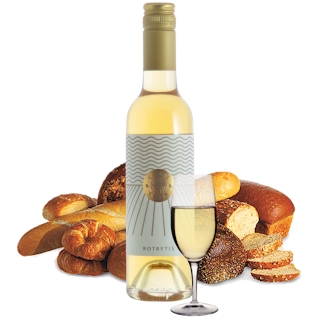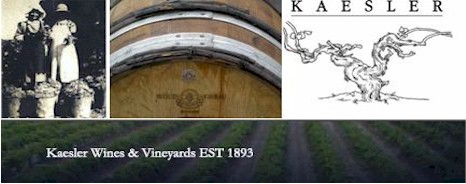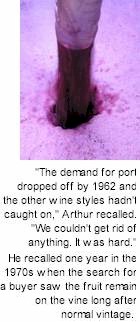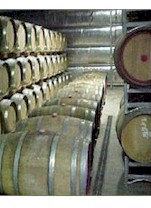


The Kaesler Vineyards were established in 1893. The family, sprung from Silesian pioneers who came to the Barossa Valley in the 1840s, took up 96 acres in 1891. They cleared the scrub and in 1893 planted out the entire holding with Shiraz, Grenache, Mataro (Mourvedre) and White Hermitage vines.

Some of the gnarled dry-grown Shiraz vines still remain and provide the backbone for the intense wines produced from the sandy loams of this prime viticultural block. In the early sixties, Arthur Kaesler saw no future in dried fruit, and pulled out the fruit trees to replace them with vines, mostly Shiraz and Grenache, still mainly for port. He also planted Mataro, just to have something different, Clare Riesling (Crouchen) and some Semillon.
The Kaeslers did not make their own wine. Traditionally, they sold their grapes to the Seppelts. The exceptional Kaesler wines now being produced had their beginning in 1997 when a young winemaker at Cellarmaster just a few hundred metres away at Dorrien noticed the power and intensity of the fruit. The old vine material was there. Led by 3.7 acres of 1893 Shiraz, more than 70% of the red vines in the vicinity of the vineyard were 40 or more years old. The Shiraz thrived on the sandy loam over clay. The Grenache was on the rockier patches, restricting the crop from this prolific producer.
Today's Kaesler Wines springs from a worldwide search for a property to produce the best possible grapes for red wine. Winemaker Reid Bosward and his co-owners, a group of international wine lovers, searched areas such as the Napa Valley, the south of France, Marlborough, and other parts of Australia before deciding on the Barossa. "No other area can produce the intensity of flavor that we have in the Barossa," says Reid.

The first site that the winelovers acquired comprised 26.3 acres of vines, eight acres of Shiraz, 5-1/2 acres of Grenache, 2-1/2 acres of Mataro, eight acres of Semillon and just over two acres of Cabernet Sauvignon. The inaugural 2000 vintage was difficult throughout the valley. Kaesler made a crush of 19.6 tonnes off the twenty six acres, but it was good stuff. In 2001, they added the crop from the newly acquired neighbouring 28.5 acres, six acres of Shiraz, eight acres of Grenache, six of Semillon, some Riesling, and some fresh plantings of Voignier. This was a variety that Reid had experience with in France as a straight white wine, and as a fascinating blend with Shiraz. The first major decision was to intensify the fruit even further. Growers who send their fruit to outside wineries may tend to keep their tonnages up. Growers who make their own wine can opt to restrict the output to increase the quality. By pruning responsibly and reducing water, Reid has already cut the yield on red wine grapes by nearly 40%. The result is density and exquisite flavour. Baume, the measure of sugar content, is high - allowing wine to be made with up to 15% alcohol.
Why make such powerful wines? "Because we can," Reid explains. "Lean wines are for a lean area. The Barossa allows us to have a high intensity of flavour. Most other places can't do this."
It is part of the partners determination to make great wine and to develop a style that offers a choice. Kaesler is built on providing a difference. The partners do not plan to take Kaesler up to 300,000 cases. The determination is to concentrate on producing excellent wine. The only thread that holds Kaesler together is the production of excellent wine.
